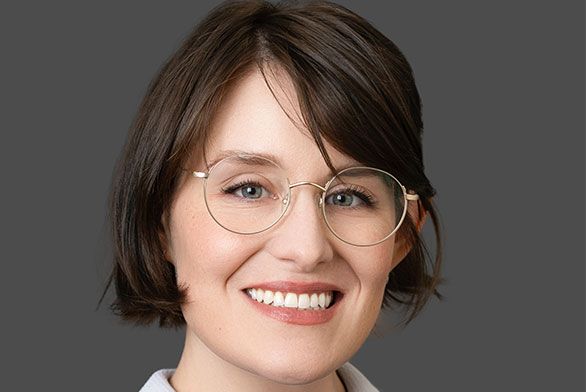Annapolis Tutor Named Hertog Foundation Dean of Humanities
March 27, 2024 | By Kirstin Fawcett
As a college student, Mary Elizabeth Halper knew she couldn’t study all the subjects she wanted in just four years. By majoring in philosophy, however, she could certainly try. “I liked philosophy because I could learn about everything: the philosophy of art, the philosophy of god, the philosophy of being,” she says. “I had an excuse to read poetry and political treatises and take ancient Greek.”

Fittingly, Halper—who went on to earn her PhD in philosophy—now works at not just one, but two interdisciplinary institutions: St. John’s College in Annapolis, where she has served as a tutor since 2021, and the Washington, D.C.-based Hertog Foundation, which appointed her as its inaugural dean of humanities in December 2023. She develops online courses for the foundation’s newly expanded virtual Humanities program, allowing individuals from around the globe to partake in broad, interdisciplinary seminars on some of history’s greatest texts, treatises, and literary works.
Halper is a relatively new faculty member, but St. John’s College is by no means new to her. She toured the Annapolis campus as a teenager and even purchased a copy of Jacob Klein’s Greek Mathematical Thought and the Origin of Algebra from the bookstore in Humphreys Hall. A Johnnie at heart, Halper “absolutely fell in love with the place,” she recalls. She ended up accepting a generous financial aid package from the University of Dallas, where she double-majored in philosophy and classics while also tackling courses in science, language, and literature. “I was determined to replicate the Program as much as possible,” she says.
Halper, who graduated as her class’s valedictorian, wanted to continue studying the humanities through the lens of philosophy. She gravitated toward Catholic University in Washington, D.C., which offers “one of the few PhD programs in the U.S. where you’re not immediately called to specialize,” she says. There, Halper completed her dissertation on the political philosophy of Plato’s Protagoras and Gorgias after meeting now-husband Aaron Halper, a fellow PhD candidate at Catholic who joined St. John’s Annapolis as a tutor in 2023.
Having studied and loved everything from math to metaphysics, Halper instinctively knew that traditional academia—a path rife with specialization, pressure to publish, and the “commodification of texts,” as she describes it—wasn’t a good fit. So while defending her dissertation in 2018, she accepted an associate director position at the Hertog Foundation. The nonprofit brings undergraduates and young professionals to Washington, D.C., for a six-week summer program that combines classical readings like Plato’s Republic with coursework in policy, strategy and defense, and economic policy offerings. Halper was helping with the residential fellowship program’s expansion in response to increased interest. Then, not even two years into her tenure, COVID-19 swept the world.
Hertog’s summer program went fully remote due to the pandemic—and much to Halper’s surprise, “it ended up being pretty good,” she says. “We ended up having some amazing students who really pulled through, and we made very high demands on them.” Their success encouraged the foundation to offer more remote courses; the Humanities at Hertog program officially launched in winter 2020, offering four seminars on classic novels, and continued seasonally until it expanded this past spring to offer year-round programming across various fields.
While Halper was helping to build something new at Hertog, she decided to revisit a decades-old dream by applying to work at St. John’s College—“the only academic job I applied to,” she says. She had already taught freshman lab, sophomore math, and language courses at St. John’s by the time the Hertog Foundation circled back last winter to see if Halper would be interested in concurrently serving as their dean of humanities. Halper met with Dean Suzy Paalman to confirm whether she could do so while also working as a tutor. The answer was unanimous: “She and I were of the same mind that what is good for liberal education is good for St. John’s,” Halper says.
The liberal arts are also good for Halper, who, prior to coming to St. John’s, disliked that she kept being told to “pick something and become an expert,” she says. Right now, she’s looking forward to tackling more advanced math, leading an online Hertog seminar on Emily Wilson’s blockbuster 2023 Iliad translation, and helming additional freshman lab classes (her favorite Program course, so far). “I’m a dabbler,” she says. “An amateur in all things.”

